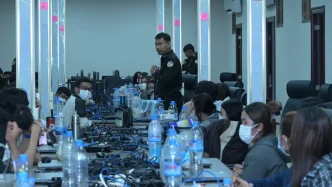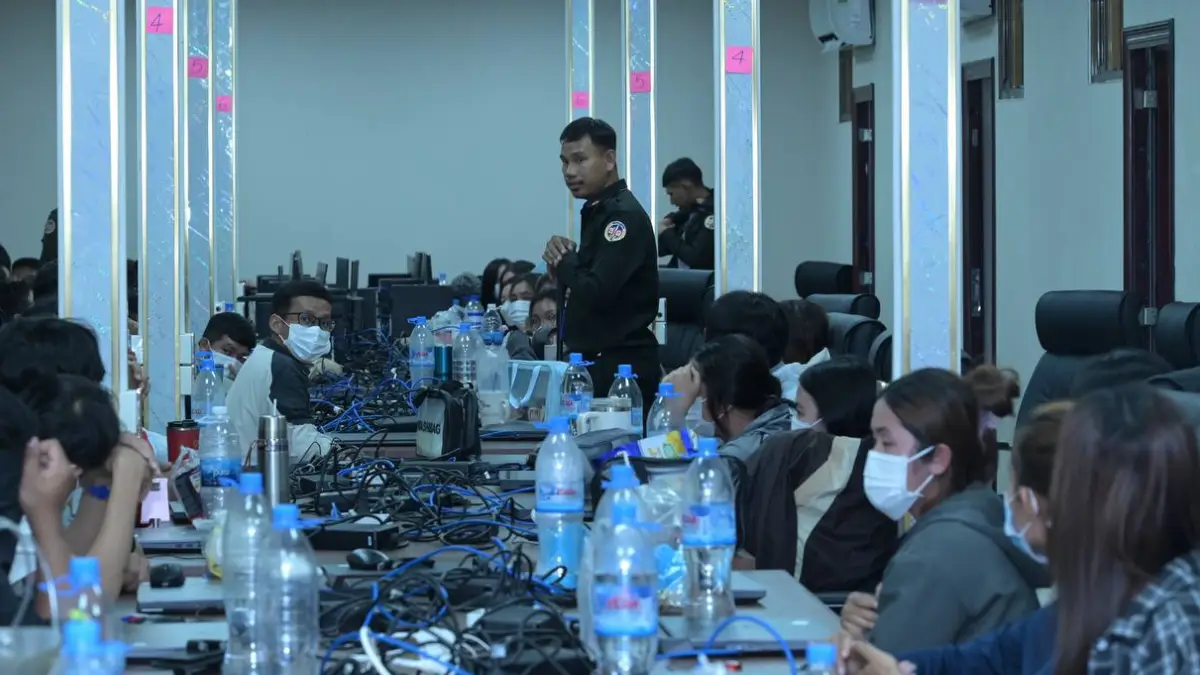On July 30, 2025, Vietnam welcomed back 85 of its citizens who had been detained in Cambodia during a sweeping crackdown on online scam operations. The handover, conducted at the Hoa Lư International Border Gate in Đồng Nai Province, marked a significant step in bilateral efforts to combat cross-border crime and protect vulnerable individuals lured into fraudulent schemes. This event underscores the growing regional challenge of online fraud and human trafficking, raising questions about the mechanisms driving such illicit networks and the measures needed to prevent further exploitation.
A Coordinated Handover Amid Rising Concerns
The formal handover ceremony at the Hoa Lư International Border Gate was overseen by the Đồng Nai Provincial Military Command in collaboration with various Vietnamese agencies. The 85 individuals, hailing from 22 different cities and provinces across Vietnam, including Đồng Nai, Ho Chi Minh City, Cần Thơ, and Thanh Hóa, were returned following weeks of coordination between Vietnamese and Cambodian authorities. Their detention stemmed from raids on scam centers in Kratie Province, part of a broader initiative ordered by Cambodian Prime Minister Hun Manet to curb online fraud nationwide.
Prior to the handover, on July 23, 2025, the Vietnamese Embassy in Cambodia worked closely with local officials to interview and verify the identities of the detained citizens. Initial findings revealed that many had been enticed by promises of lucrative online jobs, only to find themselves trapped in illegal operations often disguised as casinos or tech enterprises. Following their return, the Đồng Nai Provincial Department of Health conducted medical examinations to ensure the well-being of the returnees, while authorities carried out necessary reception and classification procedures.
The Lure of False Promises
The plight of these 85 Vietnamese citizens highlights a disturbing trend across Southeast Asia, where vulnerable individuals are increasingly targeted by sophisticated scam networks. Often advertised as “easy, high-paying online jobs” these opportunities mask exploitative conditions, including forced labor and coercion. Many victims, desperate for income, cross borders illegally under the guidance of brokers, only to become ensnared in criminal enterprises. In Cambodia, such scam centers have proliferated in recent years, exploiting lax regulations and the region’s economic disparities.
Đồng Nai authorities have taken a firm stance against these deceptive practices, directing local police to collaborate with relevant bodies to investigate and penalize those involved in orchestrating online scam operations. Particular attention is being paid to individuals and organizations responsible for luring Vietnamese citizens into these schemes. This crackdown reflects a broader recognition of the need to address not just the symptoms of human trafficking and fraud, but also the root causes—poverty, lack of opportunity, and inadequate public awareness—that make such exploitation possible.
A Regional Challenge with Global Implications
The issue of online scams and human trafficking is not unique to Vietnam or Cambodia but represents a regional crisis with far-reaching implications. According to reports from trusted regional sources, thousands of individuals from across Southeast Asia have been drawn into similar scam operations in countries like Cambodia, Myanmar, and Laos. These centers often target victims from economically disadvantaged backgrounds, exploiting their aspirations for a better life. The operations themselves are frequently linked to transnational crime syndicates, which use advanced technology to perpetrate fraud on a global scale, targeting unsuspecting individuals in wealthier nations with phishing schemes, fake investments, and romance scams.
Cambodia’s recent crackdown, initiated under Prime Minister Hun Manet’s directive, signals a shift toward greater accountability. However, the scale of the problem remains daunting. While the return of 85 Vietnamese citizens is a positive development, it represents only a fraction of those believed to be trapped in such conditions. Analysts suggest that sustained bilateral and multilateral cooperation is essential to dismantle these networks, alongside efforts to strengthen border controls and enhance public education campaigns about the risks of fraudulent job offers.
Personal Stories of Struggle and Resilience
Behind the statistics are human stories of hardship and resilience. Many of the returnees, originating from rural and urban areas alike, left Vietnam in search of better prospects, only to encounter exploitation. Their return, while a relief, is just the beginning of a long process of reintegration. Local authorities in Đồng Nai have been tasked with coordinating with the returnees’ home provinces to ensure they receive support, including psychological counseling and assistance in finding legitimate employment. The stigma associated with their experiences, however, may pose additional challenges, as communities grapple with understanding the complexities of their ordeal.
The diversity of the group—spanning 22 provinces from Lào Cai in the north to Cà Mau in the south—illustrates the widespread nature of the issue. Economic disparities across Vietnam mean that the promise of quick wealth resonates powerfully, even when the risks are evident. Addressing this vulnerability requires not only law enforcement action but also targeted economic policies to create sustainable opportunities at home, reducing the incentive to seek work abroad under dubious circumstances.
Bilateral Efforts and Future Strategies
The successful repatriation of these 85 individuals is a testament to the importance of diplomatic collaboration between Vietnam and Cambodia. Both nations have faced criticism in the past for insufficient action against human trafficking, but recent efforts suggest a growing commitment to tackling the issue. The Vietnamese Embassy’s role in verifying identities and facilitating the handover demonstrates the critical function of consular services in protecting citizens abroad, particularly in situations where legal and linguistic barriers complicate access to justice.
Looking ahead, experts argue that prevention must be prioritized alongside rescue operations. Public awareness campaigns, particularly in rural areas where internet literacy may be limited, could play a pivotal role in warning potential victims about the dangers of scam job offers. Additionally, stronger regulations on online job advertisements and harsher penalties for traffickers could deter the proliferation of these schemes. At the regional level, forums like ASEAN provide an opportunity for member states to share intelligence, harmonize legal frameworks, and coordinate responses to cross-border crime.
Legal and Ethical Dimensions
The legal ramifications of this incident are significant for both Vietnam and Cambodia. In Vietnam, authorities are under pressure to crack down on domestic actors who facilitate illegal border crossings and collaborate with foreign scam operations. Đồng Nai’s directive to investigate and “strictly handle” those involved sends a clear message that complicity will not be tolerated. At the same time, ensuring that returnees are treated as victims rather than perpetrators is crucial to upholding human rights standards. Many of those detained in Cambodia were likely coerced into criminal activities, a factor that must inform how they are processed upon return.
For Cambodia, the crackdown on scam centers is part of a broader effort to improve its international reputation, which has been tarnished by associations with organized crime. Balancing economic development with stricter oversight of industries prone to exploitation—such as online gaming and casinos—will be key to sustaining progress. The Hun Manet administration’s commitment to this cause will be tested in the coming months as pressure mounts to address the systemic issues enabling these operations to flourish.
A Path Forward
As Vietnam and Cambodia navigate the aftermath of this handover, the repatriation of 85 citizens serves as both a milestone and a reminder of the work that lies ahead. Combating online scams and human trafficking demands a multifaceted approach, combining law enforcement, diplomacy, economic reform, and education. For the returnees, the journey home is a chance to rebuild, supported by communities and authorities alike. For the region, it is an opportunity to forge stronger alliances against a shared threat, ensuring that the promise of a better life is no longer a trap for the vulnerable.
The long-term impact of these efforts remains uncertain, but one thing is clear: without sustained action, the cycle of exploitation will persist. How Vietnam, Cambodia, and their neighbors respond in the coming years will determine whether incidents like this become relics of the past or enduring challenges for generations to come.
















